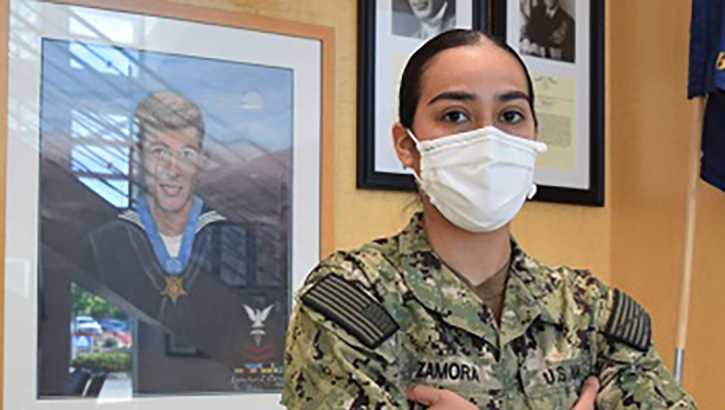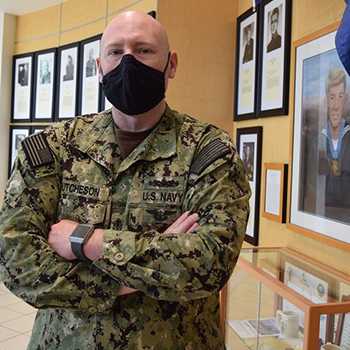Reflection, Respect for namesake of David R. Ray Branch Medical Clinic
 Standing in the shadow…on a fateful day 52 years ago, Hospital Corpsman 2nd Class David R. Ray was killed in action rendering emergency medical treatment to wounded Marines, putting service before self in his lifesaving efforts. Ray’s legacy continues on, embodied by staff at NMRTU Everett, located within the David R. Ray Branch Medical Clinic (Photo by: Douglas Stutz, NHB/NMRTC Bremerton).
Standing in the shadow…on a fateful day 52 years ago, Hospital Corpsman 2nd Class David R. Ray was killed in action rendering emergency medical treatment to wounded Marines, putting service before self in his lifesaving efforts. Ray’s legacy continues on, embodied by staff at NMRTU Everett, located within the David R. Ray Branch Medical Clinic (Photo by: Douglas Stutz, NHB/NMRTC Bremerton).
Navy Hospital Corpsman 2nd Class David R. Ray would have been 76 years old this year.
The Medal of Honor recipient (posthumously) and namesake of Navy Medicine Readiness and Training Unit (NMRTU) Everett was killed in action - a lifetime ago - for his actions at Phu Loc 6 near An Hoa in Quang Nam Province in the Republic of Vietnam on March 19, 1969.
From that fateful day 52 years ago, the legacy of the man is embodied by staff at NMRTU Everett, located within the David R. Ray Branch Medical Clinic, caring for eligible beneficiaries in the greater Naval Station Everett area.
For hospital corpsman stationed at the clinic, there is symbolic significance following in such hallowed footsteps.
"I find it very significant to work anywhere named after someone who came before. There is a lot of pride knowing you represent someone who made the highest sacrifice for our country, and seeing their picture and citation every day as you walk in," said Navy Hospital Corpsman 2nd Class Emilio Alejandro Lugo.
"It is very significant to work within a facility named after a hospital corpsman who's a Medal of Honor recipient, as it sets the highest standard while wearing the cloth of our nation and assisting those in need of healthcare," added Navy Hospital Corpsman 3rd Class Crystal Jeanette Zamora.
The high regard that the clinic sailors have for Ray has even become a mobile form of respect, venturing far beyond the clinic. The command's guidon has become an emblematic source of pride and esprit de corps for staff members, especially during the ongoing pandemic and helping to stop the spread of COVID-19.
 Navy corpsmen at the David R. Ray Branch Medical Clinic care for eligible beneficiaries in the greater Naval Station Everett area. For hospital corpsman stationed at the clinic, there is symbolic significance following in such hallowed footsteps (Photo by: Douglas Stutz, NHB/NMRTC Bremerton).
Navy corpsmen at the David R. Ray Branch Medical Clinic care for eligible beneficiaries in the greater Naval Station Everett area. For hospital corpsman stationed at the clinic, there is symbolic significance following in such hallowed footsteps (Photo by: Douglas Stutz, NHB/NMRTC Bremerton).
Chief Hospital Corpsman Sam Hutcheson "It shows the value in honoring the legacies of those who have gone before. Going out with the guidon is significantly better than just a cake or something because we aren't just getting something out of it. We're going out in what many people consider less than ideal weather while upholding Navy core values to show a commitment to honor," Lugo said, readily acknowledging that the Navy Hospital Corps rate is known for putting service before self, and that very notion - exemplified by David R. Ray - is inspirational.
"I chose this rate because of that legacy," continued Lugo. "When people ask what it is I do in the Navy, I love being able to say I'm a corpsman. Every veteran knows what a corpsman is, what we do, and the legacies that we are willing to live up to. That legacy is also a great motivational tool that require us to put in a bit more work."
This is noted in Ray's Medal of Honor citation, which reads:
"For conspicuous gallantry and intrepidity at the risk of his life above and beyond the call of duty while serving as a HM2 with Battery D, 2d Battalion, at Phu Loc 6, near An Hoa. During the early morning hours, an estimated battalion-sized enemy force launched a determined assault against the battery's position, and succeeded in effecting a penetration of the barbed-wire perimeter. The initial burst of enemy fire caused numerous casualties among the marines who had immediately manned their howitzers during the rocket and mortar attack. Undaunted by the intense hostile fire, HM2 Ray moved from parapet to parapet, rendering emergency medical treatment to the wounded. Although seriously wounded himself while administering first aid to a marine casualty, he refused medical aid and continued his lifesaving efforts. While he was bandaging and attempting to comfort another wounded marine, HM2 Ray was forced to battle two enemy soldiers who attacked his position, personally killing one and wounding the other. Rapidly losing his strength as a result of his severe wounds, he nonetheless managed to move through the hail of enemy fire to other casualties. Once again, he was faced with the intense fire of oncoming enemy troops and, despite the grave personal danger and insurmountable odds, succeeded in treating the wounded and holding off the enemy until he ran out of ammunition, at which time he sustained fatal wounds. HM2 Ray's final act of heroism was to protect the patient he was treating. He threw himself upon the wounded marine, thus saving the man's life when an enemy grenade exploded nearby. By his determined and persevering actions, courageous spirit, and selfless devotion to the welfare of his marine comrades, HM2 Ray served to inspire the men of Battery D to heroic efforts in defeating the enemy. His conduct throughout was in keeping with the finest traditions of the U.S. Naval Service."
"Everything is about perspective," stated Chief Hospital Corpsman Sam Hutcheson. “When you think you’re having a rough day, just thinking about being under enemy fire and still going from parapet to parapet tending to wounded Marines while being injured, helps bring everything into focus."
"As a hospital corpsman, you are always very aware of the legacy that has been paved before your time. To be able to work in a facility named after one of the 23 hospital corpsman Medal of Honor recipients is a real honor and also very humbling."